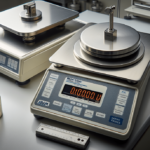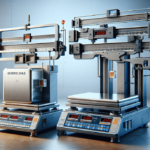Mettler Toledo PFA220 vs PEC Scales: An In-Depth Comparison
Weighing scales are indispensable in various industries, ensuring precise measurements for quality control and product performance. The Mettler Toledo PFA220 and PEC scales are two leading options in the market, each offering unique features and specifications tailored to different business needs. This article provides a comprehensive comparison of these two scales in terms of accuracy, ease of use, durability, maintenance requirements, price, and their applications across various industries to help you determine which is the optimal choice for your business.
Introduction: The Critical Role of Weighing Scales in Industry
Accurate weight measurements are fundamental in numerous industrial processes, from manufacturing to research and development. Weighing scales determine the exact weight of raw materials, components, or finished products, ensuring quality control, consistent product performance, and efficient production processes.
Moreover, precise weight measurements are essential for compliance with regulatory standards. Industries such as pharmaceuticals and food production are subject to strict regulations regarding weight accuracy. Regularly calibrated and maintained scales help companies avoid costly fines and legal issues.
Features and Specifications
Mettler Toledo PFA220
The Mettler Toledo PFA220 is a high-precision weighing instrument designed for industrial applications that demand ultra-fast and accurate measurements. Key specifications include:
- Measurement Range: Up to 220g
- Readability: 0.0001g
- Repeatability: 0.00005g
- Interface: Intuitive touchscreen
- Connectivity: Ethernet, USB, RS232
The PFA220 features a user-friendly touchscreen interface, simplifying operation and integration with production lines. Its built-in statistical functions enable users to track and analyze weighing data, which is invaluable for quality control and process optimization. Additionally, the PFA220 offers seamless connectivity options, facilitating data exchange and automation with other devices and systems, making it ideal for modern, integrated industrial environments.
PEC Scales
The PEC scales from Precision Electronic Scale Co. provide versatile weighing capabilities suitable for various industries, including pharmaceuticals, food, and chemical production. Key specifications include:
- Measurement Range: Up to 5000g
- Readability: 0.01g
- Repeatability: 0.02g
- Interface: Easy-to-use keypad
- Platform: Durable stainless-steel
PEC scales are equipped with practical features such as a tare function, allowing multiple items to be weighed in succession without manual subtraction of container weights. The auto shut-off function helps conserve battery life when the scale is not in use. The large, backlit display ensures readability in low-light conditions, and the compact, lightweight design allows for easy transport and storage, making PEC scales a convenient choice for dynamic work environments.
Detailed Comparison
Accuracy and Precision
The Mettler Toledo PFA220 excels in precision with a readability of 0.0001g and a repeatability of 0.00005g, making it ideal for applications requiring meticulous measurements. In contrast, the PEC scale’s readability of 0.01g and repeatability of 0.02g make it less suitable for ultra-precise tasks but adequate for general industrial use.
Understanding the difference between accuracy (how close a measurement is to the true value) and precision (consistency of repeated measurements) is crucial when selecting a scale. Both factors are essential for obtaining reliable results.
Ease of Use
The PFA220’s touchscreen interface allows for intuitive configuration, calibration, and operation, complemented by a modular design for easy integration with production lines. Additionally, its built-in help function provides step-by-step guidance, reducing the need for technical support.
On the other hand, PEC scales feature straightforward keypad controls and a durable stainless-steel platform, making them easy to operate. Their compact design also allows for easy movement and storage, which is beneficial for smaller workspaces.
Durability
Both the PFA220 and PEC scales are constructed with robust materials to endure harsh environments. However, the PFA220 incorporates advanced features such as adjustable feet, a four-level vibration filter, and built-in overload protection, enhancing its durability and lifespan.
The PFA220’s stainless steel weighing pan resists corrosion and damage from chemicals, making it suitable for laboratories and industrial settings. PEC scales typically use a plastic weighing pan, which may wear more quickly under heavy use.
Maintenance Requirements
The Mettler Toledo PFA220 requires minimal maintenance thanks to its automatic internal calibration and self-diagnostic system, which proactively identifies potential issues. This reduces downtime and the need for frequent external calibrations.
Conversely, PEC scales necessitate regular calibration, cleaning, and maintenance to maintain accuracy, especially when used in harsh environments or exposed to extreme temperatures.
Price Comparison
The PFA220 is priced higher due to its advanced features and superior precision, offering significant value for businesses requiring reliable and fast weighing performance for demanding applications.
PEC scales present a more affordable option without sacrificing essential weighing capabilities, making them suitable for small businesses or applications where ultra-high precision is not critical. Their compact design also adds value by facilitating easy storage and transport.
Industry Applications
Mettler Toledo PFA220
The Mettler Toledo PFA220 is versatile and serves various industries that demand precise and rapid weighing, including:
- Pharmaceuticals: Weighing active ingredients and final products with high accuracy for drug development and manufacturing.
- Food Processing: Measuring ingredients like spices and additives to ensure consistency in taste and quality.
- Chemical Production: Safely weighing hazardous materials with precision.
- Research and Development: Handling small quantities of samples for experiments and analyses.
PEC Scales
The PEC scales are widely used in industries where accurate weighing is critical for quality control and regulatory compliance, such as:
- Food Processing: Accurately measuring ingredients to maintain product standards.
- Pharmaceuticals: Measuring precise amounts of active ingredients for safe and effective medications.
- Manufacturing: Weighing raw materials and finished products to meet specifications and ensure consistent quality.
Customer Reviews and Feedback
Customer feedback for the Mettler Toledo PFA220 is overwhelmingly positive, highlighting its speed, accuracy, and user-friendly interface. Users appreciate its sleek design and the ability to store and recall frequently used weighing units, enhancing workflow efficiency.
The PEC scale also receives high ratings for its durability and excellent value for money. Customers commend its reliable performance and ease of use.
However, some users of PEC scales have reported calibration challenges, noting that frequent recalibration may be necessary to maintain accuracy. Despite this, the majority find PEC scales reliable and efficient for their operational needs.
Conclusion: Selecting the Optimal Scale for Your Business
Choosing between the Mettler Toledo PFA220 and PEC scales ultimately depends on your specific business requirements. If your operations demand ultra-fast and highly precise weighing, the PFA220 is the superior choice despite its higher price point. It is ideal for industries where accuracy and reliability are paramount.
Conversely, if you seek a more affordable solution with reliable weighing capabilities for less demanding applications, PEC scales offer excellent value. They are particularly suited for small to medium-sized businesses or environments where ease of use and portability are prioritized.
Evaluate your business’s weighing needs, budget, and the specific features each scale offers to make an informed decision that aligns with your operational goals.
Additional Resources
- Industrial Weighing Basics - American Weighing
- Weighing Scale - Britannica
- Accuracy in Measurement: Importance and Methods - National Institutes of Health






















